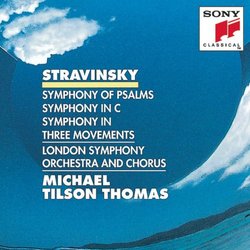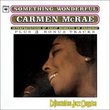| All Artists: Igor Stravinsky, Michael Tilson Thomas, Stephen Westrop, London Symphony Chorus, London Symphony Orchestra Title: Stravinsky: Symphony of Psalms; Symphony in C; Symphony in Three Movements Members Wishing: 0 Total Copies: 0 Label: Sony Release Date: 1/11/1994 Genre: Classical Styles: Historical Periods, Modern, 20th, & 21st Century, Symphonies Number of Discs: 1 SwapaCD Credits: 1 UPC: 074645327525 |
Search - Igor Stravinsky, Michael Tilson Thomas, Stephen Westrop :: Stravinsky: Symphony of Psalms; Symphony in C; Symphony in Three Movements
 | Igor Stravinsky, Michael Tilson Thomas, Stephen Westrop Stravinsky: Symphony of Psalms; Symphony in C; Symphony in Three Movements Genre: Classical
|
Larger Image |
CD DetailsSynopsis
Product Description Similarly Requested CDs
|
CD ReviewsGreat Music, OK Recording & Performance Timothy Dougal | Madison, Wi United States | 12/29/2003 (4 out of 5 stars) "This disc presents Stravinsky's 3 great symphonies in chronological order, recorded in 'high definition' digital sound. The performances are quite good, but occasionally underenergized, and the sound is OK, but generally could be better (too much dynamic range for me, and occasional intrusive noises from the orchestra). I suspect it would be more satisfactory with more expensive equipment in a soundprood listening room! Basically, I agree with Leslie Gerber." Detailed, fitfully exciting conducting with no spine at all Santa Fe Listener | Santa Fe, NM USA | 01/07/2006 (3 out of 5 stars) "This CD would be a dud if it styaed on the level of the first work, the Symphony of Psalms, which MTT plays as smoothly as melted candle wax and far too piously. There's hardly a sharp accent in it; all the corners are rounded off. As far as detail goes, the LSO and its professional chorus are excellent, but there's no spine to hold the piece together. Two stars.
Both the Sym. in C and the Sym. in Three Movements start off vigorously. MTT thinks of them as melliflous works, so there's no acerbic edge to the Sym. in Three Movements. However, the conductor's sprightliness generates its own verve and joy--in spots. Maddeningly, just when he gets going, MTT is liable to lapse into pointless noodling and slack rhythms--this is especially true in the slow movement of both works. At his best he offers delightful inner details, and there's no doubt that MTT directs traffic very well in the intricately contrapuntal passages. The absence of a spine to hold the pieces together remains a problem. Overall, this CD will appeal most to those who want Stravinsky to be a lot prettier than he usually is (whether condcuted by the astringent composer himself or others) and will turn off listeners who expect this music to be bracing, jagged, and strong-limbed." |

 Track Listings (10) - Disc #1
Track Listings (10) - Disc #1



